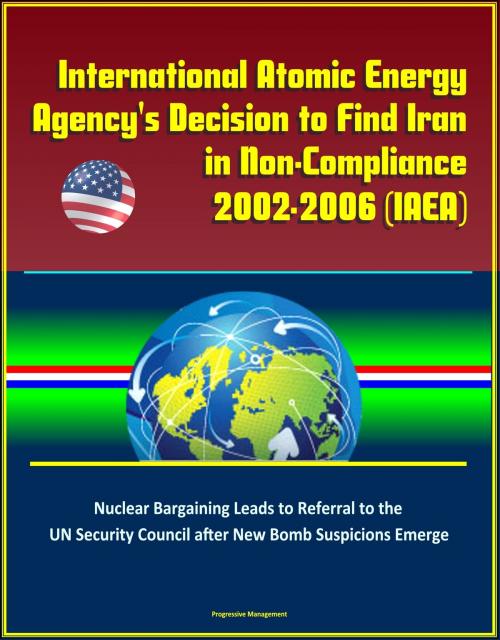International Atomic Energy Agency's Decision to Find Iran in Non-Compliance, 2002-2006 (IAEA) - Nuclear Bargaining Leads to Referral to the UN Security Council after New Bomb Suspicions Emerge
Nonfiction, History, Military, Nuclear Warfare, Middle East| Author: | Progressive Management | ISBN: | 9781370153862 |
| Publisher: | Progressive Management | Publication: | January 22, 2017 |
| Imprint: | Smashwords Edition | Language: | English |
| Author: | Progressive Management |
| ISBN: | 9781370153862 |
| Publisher: | Progressive Management |
| Publication: | January 22, 2017 |
| Imprint: | Smashwords Edition |
| Language: | English |
This excellent report has been professionally converted for accurate flowing-text e-book format reproduction. On August 14, 2002, at a press conference in Washington, DC, the National Council of Resistance of Iran (NCRI), an exiled Iranian opposition group, drew worldwide attention when it publicly accused Iran of clandestinely developing nuclear weapons. Alireza Jafarzadeh, then-U.S. media spokesperson for the NCRI, described two "top secret" nuclear facilities being constructed in Iran at Natanz and Arak under the guise of front companies involved in the procurement of nuclear material and equipment. Noting that media attention had focused on Iran's publicly declared civilian facilities, Jafarzadeh claimed that "in reality, there are many secret nuclear programs at work in Iran without knowledge of the International Atomic Energy Agency (IAEA)," the international body responsible for verifying and assuring compliance with safeguards obligations under the 1968 Nuclear Non-Proliferation Treaty (NPT).
Nearly 3 months before the NCRI's press conference, the U.S. Government reportedly briefed the IAEA on Iran's clandestine nuclear activities. The IAEA had received briefings from several member states since the early 1990s that indicated possible undeclared nuclear activities in Iran. Yet IAEA inspectors needed Iranian authorities to provide physical access to any suspected sites in order to verify the absence of undeclared nuclear material and activities. The public revelations of Iran's clandestine nuclear activities in 2002 unleashed one of the most intensive and highly publicized inspections in the history of the IAEA. In the shadow of the political divisions wrought by the U.S.-led military campaign against Iraq, the IAEA Board of Governors—the Agency's main policymaking body composed of 35 member states—delayed the decision to find Iran in non-compliance with its NPT safeguards agreement.
Introduction * IAEA Nuclear Inspections Begin * Nuclear Bargaining: Europe-Iran Negotiations * The Tehran Joint Declaration Collapses * New Suspicions Emerge * Nuclear Negotiations Resume: The Paris Agreement * Toward a Formal Finding of Non-Compliance * The Aftermath: Referral to the UN Security Council * Epilogue * Appendix 1: An Overview of the IAEA * Appendix 2: Chronology of Key Events (2002-2006)
This excellent report has been professionally converted for accurate flowing-text e-book format reproduction. On August 14, 2002, at a press conference in Washington, DC, the National Council of Resistance of Iran (NCRI), an exiled Iranian opposition group, drew worldwide attention when it publicly accused Iran of clandestinely developing nuclear weapons. Alireza Jafarzadeh, then-U.S. media spokesperson for the NCRI, described two "top secret" nuclear facilities being constructed in Iran at Natanz and Arak under the guise of front companies involved in the procurement of nuclear material and equipment. Noting that media attention had focused on Iran's publicly declared civilian facilities, Jafarzadeh claimed that "in reality, there are many secret nuclear programs at work in Iran without knowledge of the International Atomic Energy Agency (IAEA)," the international body responsible for verifying and assuring compliance with safeguards obligations under the 1968 Nuclear Non-Proliferation Treaty (NPT).
Nearly 3 months before the NCRI's press conference, the U.S. Government reportedly briefed the IAEA on Iran's clandestine nuclear activities. The IAEA had received briefings from several member states since the early 1990s that indicated possible undeclared nuclear activities in Iran. Yet IAEA inspectors needed Iranian authorities to provide physical access to any suspected sites in order to verify the absence of undeclared nuclear material and activities. The public revelations of Iran's clandestine nuclear activities in 2002 unleashed one of the most intensive and highly publicized inspections in the history of the IAEA. In the shadow of the political divisions wrought by the U.S.-led military campaign against Iraq, the IAEA Board of Governors—the Agency's main policymaking body composed of 35 member states—delayed the decision to find Iran in non-compliance with its NPT safeguards agreement.
Introduction * IAEA Nuclear Inspections Begin * Nuclear Bargaining: Europe-Iran Negotiations * The Tehran Joint Declaration Collapses * New Suspicions Emerge * Nuclear Negotiations Resume: The Paris Agreement * Toward a Formal Finding of Non-Compliance * The Aftermath: Referral to the UN Security Council * Epilogue * Appendix 1: An Overview of the IAEA * Appendix 2: Chronology of Key Events (2002-2006)















